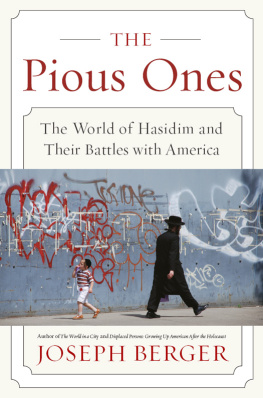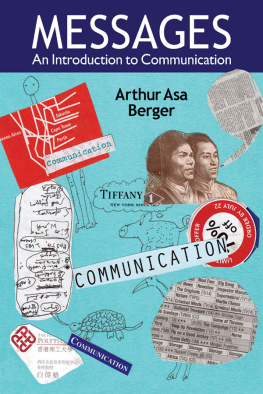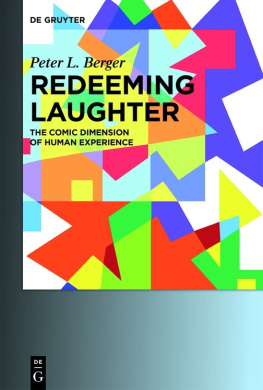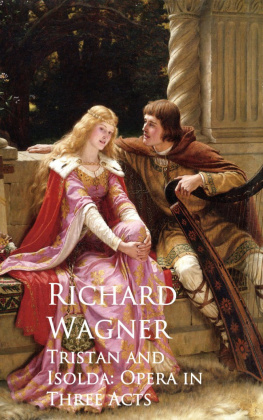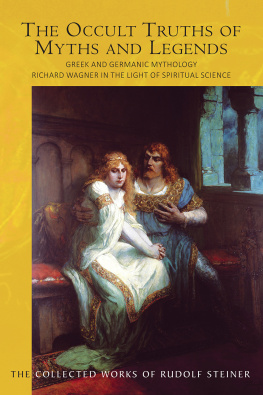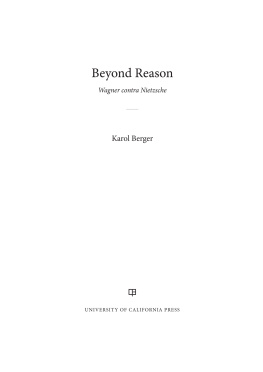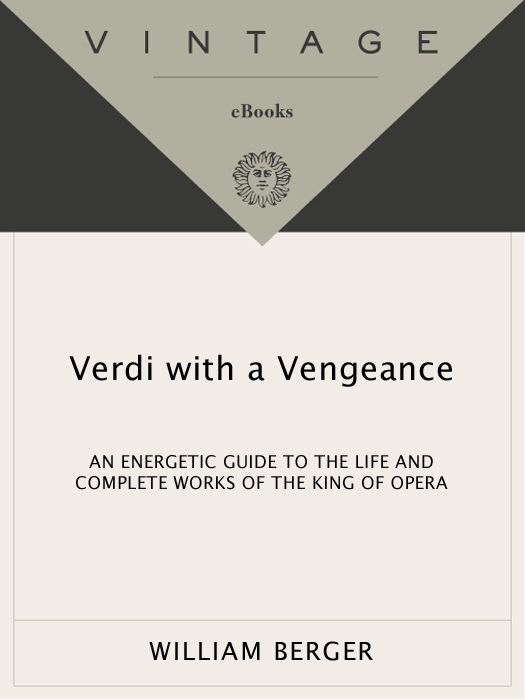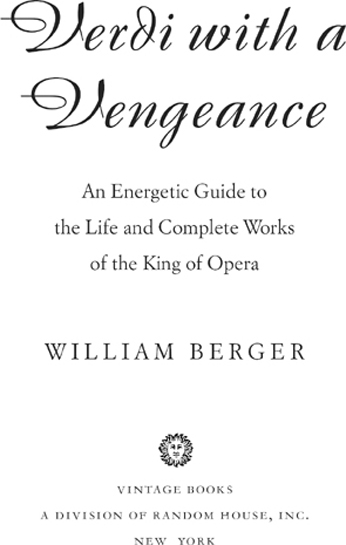
WILLIAM BERGER
Verdi with a VengeanceWilliam Berger was born in California and studied Romance languages and music at the University of California at Santa Cruz. He worked for five years at the San Francisco Opera Company, where he acquired for the companys recorded music collection. He is the author of Wagner Without Fear: Learning to LoveAnd Even EnjoyOperas Most Demanding Genius. He contributed to James Skofields libretto for The Dracula Diaries, an opera with music by Robert Moran, and wrote the libretto for The Wolf of Gubbio with the composer Patrick Barnes. Mr. Berger has appeared on NPRs Performance Today and is a regular commentator on At the Opera. He lives in New York and is currently at work on a performance piece, Karajans Wake.
ALSO BY WILLIAM BERGER
Wagner Without Fear
Contents
PART ONE
(Re)Introducing Verdi
Introduction:
With a Vengeance?
SI! VENDETTA!
I take Verdis art very personally. It has always been there, constantly emerging in a process that I hope will continue for a long time. The year that Walkmen came out, the first tape I made was all Verdi, selections culled from various recordings I borrowed. Side A was for getting revved up in the morning, going from the mellow (Come rugiada al cespite from Ernani) to the frantic (the love duet from Ballo). Side B was the reverse, for calming down in the evenings, starting with the Act I trio from Trovatore and winding down to Madonna degli angeli from Forza. And thus I would ride the Van Ness Avenue bus, watching San Francisco roll by like a performance, amazed at the uncanny relationship between Verdi and real life. His music was not so much the soundtrack of life as its actual subtext.
Eventually, the tape became superfluous. All of us carry around a sort of inner jukebox, and mine appears to be set for Verdi. I hear it, or imagine that I hear it, in every situation life presents. I remember going to court to answer for a traffic ticket, imagining that I heard the monks chant from Don Carlos emanating from the chilly Hall of Justice. I remember seeing my late grandmother watching black-and-white TV with all the lights turned out, thinking how much she was like Azucena, the gypsy woman from Trovatore who stares at the fire, obsessed with the past. I remember a young woman at a travel agency actually trying to seduce me into buying an island vacation package, and imagining her singing Aidas evocation of her mountain homeland. I invariably hear the Anvil Chorus at the gym. Any political or community meeting becomes the Council Chamber scene from Boccanegra, but so does any sale at Macys. I have heard O signore, dal tetto natio while driving around the hills of California. And on a few memorable occasions I have heard Va, pensiero while making love.
I cant be the only person who has noticed these odd correlations. On one level, Giuseppe Verdi might well be considered the worlds most popular composer. His music, or at least snippets of it, is hummed, whistled, and wailed all over the world. His operas are performed more than any other composers. Opera companies have been proliferating throughout the world, and especially in the United States, where new companies are appearing even faster than major league sports franchises. A recent list of professional opera companies counted seventy-one in the country, and virtually every one of these has performed Verdi within the last two years. This is in addition to the hundreds of colleges and universities that now offer opera workshops where Verdi is performed live and, in many instances, on a par with or exceeding the professional companies. Public television routinely boasts audiences of three or four million for their opera broadcasts, a full quarter of which feature the works of Giuseppe Verdi. We hear bits and pieces of Verdis music on the radio, on television, and in movies.
Any Verdi fan should be thrilled by all this. Right?
Wrong. These numbers represent tremendous growth and a level of public consumption that would have been unthinkable years ago, but they are still paltry compared to the numbers generally bandied about by American media moguls. Nor should this surprise anyone. Opera is regarded as a foreign brand of entertainment, a weird and bastard art form, and something to be apologized for. Recently the creators of the new musical extravaganza Aida felt compelled to say in an interview that their work was not based on the Verdi opera, but derived from the original source legend of Aida. There was some amusing subsequent backpedaling when it was pointed out to these good gentlemen that there is, in fact, no original source legend for Aida. The creators of the new musical needed to make it clear that they were not decadent Europeans attempting to foist unwanted haute culture upon our wholesome American value system.
Am I being extravagant? I wonder. The state of New York is currently running a fascinating, if annoying, television commercial for its lottery. It is filmed during a supposed performance of a Verdi opera. While the prima donna is squawking through a cadenza, a distinctly guy-next-door type pushes a podium onto the stage. Soprano shrieks. The audience of socialites in evening wear (black ties, tiaras, lorgnettes) gasps. The man announces that the New York State Lotto is now X million dollars! Socialites run for the exits and the theater is empty in a matter of seconds. Cool, says Lottoman.
Lets take this apart. The music onstage is Traviata, although the costumes look more like Il trovatore. The general impression is generic Verdi. The prima donna is not outfitted in a flattering manner, nor does she sing particularly well. The people onstage are meant to look and sound stupid. The audience is every Americans nightmare of an opera crowd: all white, all over sixty, and all overdressed. Why a bunch of stiff old millionaires would need to run out to buy lottery tickets is beyond me, but they do. Ironically, this is all filmed at the Brooklyn Academy of Music. The last time I checked, the audience there didnt look like that. Green mohawks and razor blades in the nose are much more comme il faut at BAM. No matter. It is necessary to believe that opera audiences look a certain way. Its where the elite meet to be effete. I have attended hundreds of opera performances all over the world and I can honestly say that I have never once seen anybody using a lorgnette.
If you havent seen that particular Lotto commercial, it doesnt matter. There are plenty of other examples. It is truly galling that Giuseppe Verdi, of all people, should be used as the touchstone for this symbolism. If you are already an opera fan, then you know that Verdi has been treated with a lot of contempt by musicologists and other experts. The snobberyyes, snobberyon the subject of Verdi comes from all sides. I cant think of any artist whose life and work was less tainted by elitism than Verdi. In fact, his reputation has suffered among serious music people for this precise reason. At this point, its worth taking a look at the history of Verdi and the musical establishment to understand where we are today.


